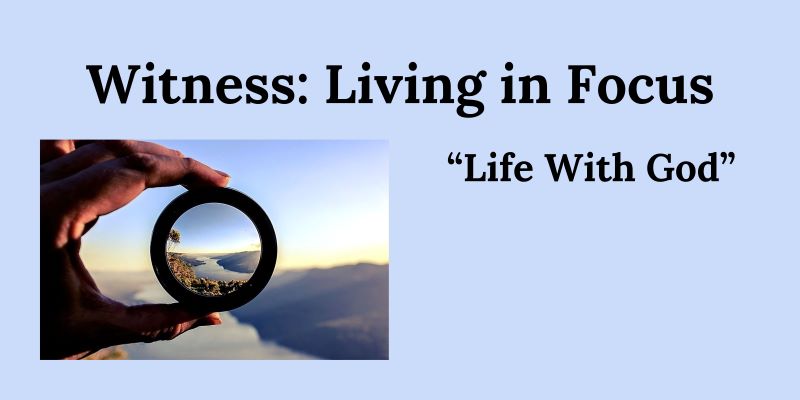
1 John 5:9-15
May 12, 2024
I was attending a pastors’ conference recently, where I had the opportunity to hear a variety of presentations about creative ways we can share the Gospel of Jesus with our neighbors. It was exciting to hear how Lutheran schools, child development centers, food banks, sports programs, mental health awareness, and social media were all being used to reach people with the love of Jesus. As I was listening to the different presenters, I couldn’t help but think that the way we used to do evangelism when I was in seminary would probably not be very effective today. At that time one of the most popular methods of witnessing or doing outreach to people who did not attend a church was to ask them the following question: If you were to die tonight do you think you would go to heaven? People would usually answer this question by saying, “I think so, I hope so.” But sometimes they would simply say, “I don’t know.” These answers would usually lead to another question: “If you were to die tonight and found yourself standing before Jesus at the gates of heaven, what would you say if Jesus asked you, ‘Why should I let you into my heavenly kingdom?’” At this point, you would usually hear answers that had to do with one’s behavior or attitude in doing good things during their life. While these answers sounded logical, unfortunately they were not accurate according to the Bible. We learned that many people back then and still many people today really don’t know if they have eternal life or how to possess eternal life.
How would you answer those questions? Do you know, for sure, that you will have eternal life? Fortunately, John wrote our second lesson for today to answer these questions. It was about 50-60 years after Jesus rose from the dead on that first Easter, and things were not going well for Christians as false teachings had infiltrated the church. These false teachings suggested that Jesus didn’t really physically rise from the dead, He just appeared to; and no one could be absolutely sure if they have eternal life with God. As a result, many believers started to question their faith and they wondered if life with God was really possible.
What’s amazing is that here we are about 2000 years later and people today are still having some of those same doubts. While studies show that spirituality is growing today, many are looking for answers to their spiritual questions outside of the church. Why? Because many people are expressing a disinterest in the church due to political entanglements, misalignment with Christian beliefs, a lack of connection with the local community, and uncertainty about truth.
That’s why John’s words in our second lesson are so relevant for us today. The Word of God is truth and it offers us certainty. John said in verse 13, “I write these things to you who believe in the name of the Son of God that you may know that you have eternal life.” That word, “know” is very important in that there are actually 2 words for “know” in the Greek language, the original language of the New Testament. The word used here describes a state of knowing, whereas the other word describes a process of knowing. Now, what’s the difference? If I say, “I know that I am an American,” I am declaring something I know to be true beyond a shadow of a doubt. When I say, “I know what it means to be an American” that’s a knowledge I am still acquiring and growing into. One kind of knowing is complete and factual; the other is progressive and based on experiences. While both kinds of knowing are true of a Christian, it’s the certain, factual kind of knowing that John is emphasizing here.
And what is it that John wants people to know beyond a shadow of a doubt? Two things: First, eternal life is found only in Jesus Christ. It is not something we find in ourselves or in our world. Jesus brought this life to us when He came to this earth and lived it for us. He showed us what it means to live life to the fullest – in relationship with God and for the good of others. The world had never truly seen life as it was meant to be until Jesus came and lived it among us. So logically, the only place to find real life is in the One who actually lived it – Jesus Christ.
The Second thing John wants us to know is that “If you have the Son, then you have life.” Now that may sound a little odd. What does it mean to “have the Son” as it says in verse 12? We know what it means to have an object, but how do you have a person? To have a person is to be in some kind of relationship with that person. When we say, “I have a spouse” or “I have a friend,” we’re declaring a certain kind of relationship. But you would never say, “I have a stranger,” because there is no relationship there. So to have Jesus is to be in a relationship with Him – a relationship defined by belief , trust, and obedience.
So John is telling us in this text that eternal life is not just something to aspire to or to dream about. Eternal life is something you can possess right now. If you have a relationship with Jesus, you have eternal life – you can know and be certain. Again, John says in verse 13, “ I write these things to you…that you may know that you have eternal life.”
What’ interesting today is that our Gospel lesson was also written by John, but his purpose in writing the Gospel was different from his purpose in writing our second lesson. At the end of his Gospel, John said, “These are written that you may believe that Jesus is the Christ, the Son of God, and that by believing you may have life in his name” (John 20:31). John wrote His Gospel for those who were seeking, so that they would believe in Jesus. But he wrote our second lesson, this book we call 1 John, at the end of the New Testament for people who already believe, so that they would know that eternal life is found in Jesus. So this letter really picks up where the Gospel ends, and when you put his Gospel and his letter back to back, what you discover is that John has mapped out a journey for our spiritual lives.
The journey begins with hearing the Good News of Jesus and that is followed with believing the Good News. And with believing comes living the Good News in your daily life, knowing that you are a child of God, now and forever. Knowing is key, because when you know that you’re going to heaven, fear and doubt will no longer weigh you down. You can enjoy the journey and confidently live the life God has called you to live, because you know where you are going.
Think of it this way. Imagine you’re taking your family on vacation to Camp Linn Haven in the mountains where you will be staying in a nice cabin all week. You load up the car and everyone’ excited, as you make your way up the mountain. After several hours you take an exit off of the main road and you start following this long, narrow, winding road through the mountains, just as the navigation system on your phone or in your car tells you. However, after traveling on this road for a while, you start to wonder if you made a wrong turn. You and your spouse start to argue a bit over whether you should have gone right at the last fork in the road instead of left. Your children are getting sick from the winding roads, and suddenly the thought of spending a week in a cabin in the mountains doesn’t sound nearly as wonderful as it did a few hours ago. Then you come to another fork in the road, but this time there is a sign: “Camp Linn Haven straight ahead.” You breathe a sigh of relief, you and your spouse apologize to each other, the children start looking out the window for the camp, and now everyone’s looking forward to a week together in the mountains. Why? Because you know you’re on the right road. You know where you are and where you are going. That’s the kind of assurance, the kind of certainty, John offers to us in this text concerning life with God.
Many people are making their way through life without really knowing where they are, where they are going, and whether they’re on the right road, and that can make for a very unhappy and unsatisfying journey. But when you know where you are going, it changes everything. No one knows what the future holds, but when you know that true life is found in Jesus, you can face the future with confidence and enjoy the journey, knowing that your life is in God’s hands. May that certainty move all of us to share this wonderful news of Jesus with everyone we meet.


